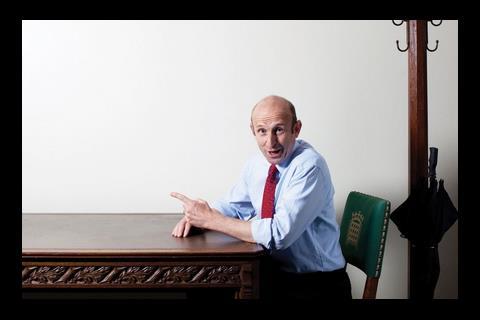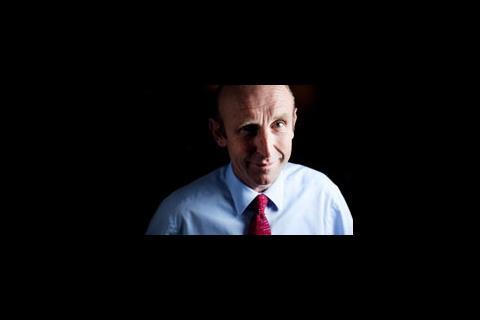New minister lines up ┬Ż1.7bn for PFI homes and promises thoroughgoing rethink of housebuildersŌĆÖ business model
Almost two billion pounds of funding for PFI housing will be unlocked shortly, according to John Healey in his first major interview since replacing Margaret Beckett as housing minister last month.
The boost is expected to be one of four policy statements due as ║┌Č┤╔ńŪ° went to press. Together they are intended to define the governmentŌĆÖs approach to housing before the general election. The others will concern eco-towns, overall affordable housing spending and the definition of zero carbon.
Healey said: ŌĆ£IŌĆÖm lining up new funding to build homes and enable the regeneration of some of the most deprived areas of the country. ItŌĆÖs likely to be about ┬Ż1.7bn in PFI credit funding.ŌĆØ
He added that the statement would be made ŌĆ£quite shortlyŌĆØ ŌĆō political code for before next TuesdayŌĆÖs parliamentary recess ŌĆō and would identify which schemes are to get the money.
He said he would also confirm spending in the first three months of the year on the National Affordable Housing Programme as well as what has been allocated in the last month. Sources said the announcement was expected later today.
Both programmes are separate to the ║┌Č┤╔ńŪ° BritainŌĆÖs Future programme. This programme, announced by the prime minister two weeks ago, is intended to invest an additional ┬Ż1.5bn in 20,000 affordable and 10,000 private homes over two years.
Tempting though it is to see the role of housing minister in the recession as akin to the captain of the Titanic on its maiden voyage, Healey believes he can make a difference in the time available.
He says: ŌĆ£We can do a number of important things at the same time. We need to build more homes, and something like one in 14 jobs in the economy is in the construction industry, so we can help create jobs at the same time.ŌĆØ
Crowded in-tray
With the 39% fall in mortgage lending in the past year (see page 20), the collapse in housebuilding activity and a new edition of Part L in the offing, Healey has plenty in his in-tray. Yesterday he was due to unveil three or four favoured locations for eco-towns, a policy many had thought had received the last rites. Next week he will publish the final definition of what zero-carbon means.
This last job is probably the most important, as housebuilders will have to live with the consequences for years to come. A consultation before Christmas opened the way to making the standard less onerous, but housebuilders have been lobbying for further concessions. The main one is to reduce the present target of making home 70% more energy efficient to 44%. So will he give in to industry pressure? It sounds possible. ŌĆ£We canŌĆÖt get away from the requirement to build homes that are greener, cheaper to run and zero carbon. However, housebuilders have given us a valuable practicality check. The announcement will reflect the views weŌĆÖve received.ŌĆØ
Healey is under no illusion as to how bad the situation is. This week a select committee of MPs said the government had to rethink ways of meeting its target of building 240,000 homes a year ŌĆō in the past 12 months just 90,130 have been started. He seems to wholly accept that, with the caveat that 240,000 homes is an ŌĆ£aspirationŌĆØ rather than a target. But he defends the fact that this yearŌĆÖs targets have had to be ripped up. ŌĆ£If you ask any of your readers, their plans, their budgets, their spending, their targets will all have been changed by recession. Just in the same way as weŌĆÖve had to rework our plans, targets and spending ŌĆō and thatŌĆÖs what weŌĆÖve done.ŌĆØ
Future investment
He maintains that the government has timed its intervention well, despite the fact that 55,000 affordable homes will be built this year, compared with the governmentŌĆÖs target of 70,000. But he warns that this level of investment cannot be sustained when the market recovers: ŌĆ£There will be a scaling back of the additional cost, for government, of getting a home built. WeŌĆÖve had to up the grant rates [the amount of subsidy available per home] and I can only do that if people can be persuaded it is value for money.ŌĆØ
Healey does not deny reports that some of the money for the ┬Ż1.5bn in Gordon BrownŌĆÖs ║┌Č┤╔ńŪ° BritainŌĆÖs Future programme has been taken from decent homes money. ŌĆ£ItŌĆÖs something weŌĆÖll clarify,ŌĆØ he says.
The former Treasury man has a warning for housebuilders ŌĆō but welcome news for contractors. He says housebuildersŌĆÖ reliance on the development land market meant they stopped building quickly when the downturn came, and he wants to explore a different business model.
This follows on from the Homes and Communities Agency plan to form joint ventures with contractors on public land to mitigate development risk.
He says: ŌĆ£Being businesses that are contingent on movements in land values, they are particularly volatile if the economy swings. One of the elements of the housing pledge, will be to test a different kind of building model. One that is less development-based, and is almost contractual. This may bring new players, a degree of innovation to design and build, and a healthy competition housebuilders maybe havenŌĆÖt seen before.ŌĆØ
The housing pledge
Gordon BrownŌĆÖs ║┌Č┤╔ńŪ° a Better Future announcement contained a ┬Ż1.5bn package of measures to stimulate housebuilding, with the money taken from underspending in other departments and ┬Ż600m from other communities department programmes. It comprised:
- ┬Ż750m for grant-funded affordable housing
- ┬Ż500m to the kickstart programme for stalled housing and regeneration schemes to unlock the construction of 4,000 homes
- ┬Ż250m for direct development by local authorities of about 3,000 homes
- A public land programme for about 500 new homes initially, designed to bring new construction players into the housing market
CV
1960 Born in Wakefield
1994 Campaigns director for the Trades Union Congress
1997 Elected MP for Wentworth
2001 Junior skills minister
2002 Economic secretary at the Treasury
2007 Local government minister
Healey on ŌĆ”
Ditching ŌĆ£consequential improvementsŌĆØ in Part L
ŌĆ£In my view, in the present economic downturn, the environmental case didnŌĆÖt offset the cost and potential complexity in the proposals thus far outlined.ŌĆØ
Why weŌĆÖre not going to be told what the government will spend on housing before the election
ŌĆ£We still have nearly two years of this spending review period to run. I think you canŌĆÖt sensibly plan your public spending, or tax plans, or budgets - particularly if you want to set them on a multi-year basis - until youŌĆÖre clearer about the likely state of the economy.ŌĆØ
The failure to increase banksŌĆÖ mortgage lending levels
ŌĆ£It depends what your benchmark is. If we hadnŌĆÖt stepped in and put in what was needed to essentially save the banking system, then thereŌĆÖd be no banks or financial institutions to be doing any mortgages. The banks we have a large public stake in have made commitments to increase their lending this year. The element weŌĆÖre missing is the overseas lending. ItŌĆÖs hard for British based banks to make up that gap.ŌĆØ
His priorities and the recession
ŌĆ£Recession has knocked everybodyŌĆÖs plans and targets sideways. At the moment my first priority is housing and housebuilding making a contribution to seeing this country through recession.ŌĆØ





























No comments yet